2021 Winter Newsletter
Dear Friend of the Gilder Lehrman Institute,
Only 15% of eighth graders across the country are proficient in US history.
Only 23% of them are competent in civics.
These statistics represent a profound decline since 2014, according to the most recent National Assessment of Educational Progress report.
Last year, many K–12 US history classes were significantly pared back. Teachers and students alike experienced massive school disruptions. Educators now have the herculean task of teaching a year’s worth of new curriculum while addressing significant pandemic learning loss.
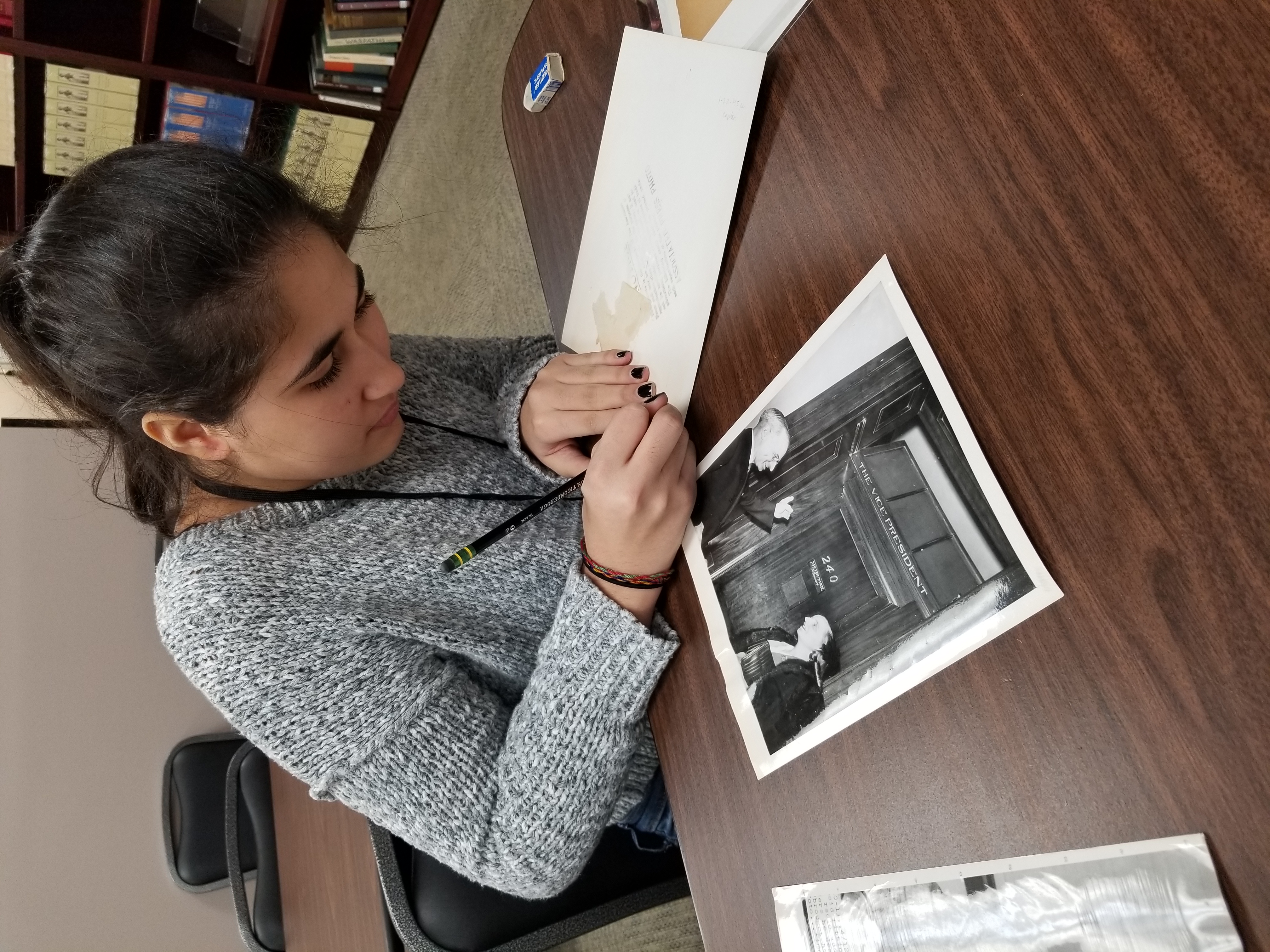 The Gilder Lehrman Institute strives to confront these troubling statistics and challenging times head-on through our free Affiliate School Program, which fills a critical need for more than 56,000 teachers and almost 8 million students who are located in all 50 states and 85 countries. Affiliate Schools receive resources, programs, and special offers, including historical posters, document-based books, and self-paced courses with eminent historians who bring diverse perspectives while always grounding their teaching in the best scholarship and historical documents.
The Gilder Lehrman Institute strives to confront these troubling statistics and challenging times head-on through our free Affiliate School Program, which fills a critical need for more than 56,000 teachers and almost 8 million students who are located in all 50 states and 85 countries. Affiliate Schools receive resources, programs, and special offers, including historical posters, document-based books, and self-paced courses with eminent historians who bring diverse perspectives while always grounding their teaching in the best scholarship and historical documents.
We just welcomed our 30,000th Affiliate School—Sequoyah High School in Tahlequah, Oklahoma—and plan to celebrate this milestone by sending schoolwide sets of Gilder Lehrman Institute publications and offering an in-school historian lecture on a topic of the school’s choosing.
As you read through our Year End Newsletter for 2021, please consider supporting our cause through a donation. Every donation, no matter what size, will make a difference.
As ever,
James G. Basker
President and CEO of the Gilder Lehrman Institute
HOLIDAY GIFT SHOPPING AT GLI
The Gift Shop
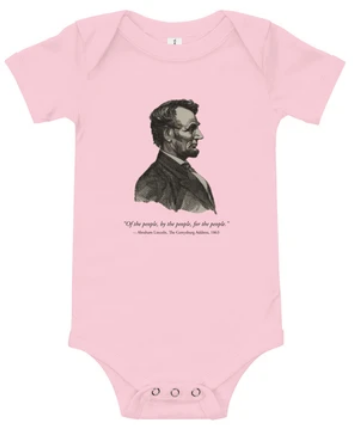 The Gilder Lehrman Gift Shop features favorites from the Gilder Lehrman Collection—a collection spanning 500 years and more than 80,000 documents—for teachers, parents, supporters, and history enthusiasts.
The Gilder Lehrman Gift Shop features favorites from the Gilder Lehrman Collection—a collection spanning 500 years and more than 80,000 documents—for teachers, parents, supporters, and history enthusiasts.
From household items to apparel, historical posters to GLI publications, the Gilder Lehrman Gift Shop offers a wide range of perfect holiday gifts.
A couple of ideas:
With a quote from President Abraham Lincoln’s Gettysburg Address, you can dress your baby “of the people, by the people, for the people” with this 100% cotton one piece. It has a three-snap leg closure for easy changing, a comfortable envelope neckline, and a beautiful print.
This is one of many items on sale now in the seasonal Holiday Shop.
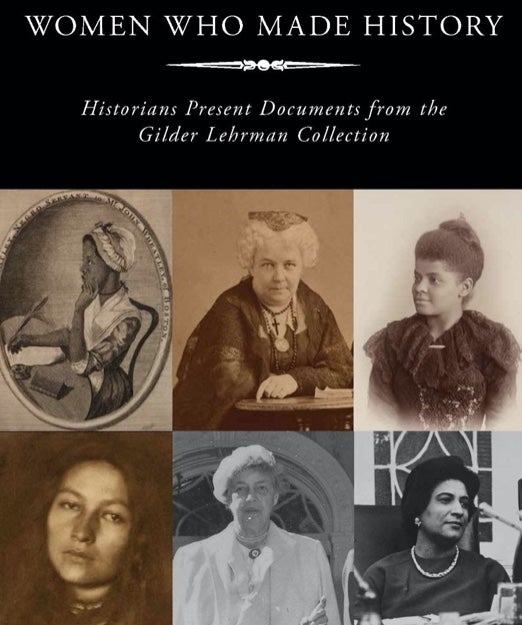
Women Who Made History: Historians Present Documents from the Gilder Lehrman Collection
One of several publications from the Gilder Lehrman Institute, this volume explores the achievements and legacies of American women who fought for liberty and equality across more than 200 years of American history. In sixteen essays centered on documents in the Gilder Lehrman Collection, leading American historians recount the stories of some of these women and their hard-fought battles.
While you’re in the shop, browse our coffee mugs featuring compelling historical images (like this 1943 World War II recruiting poster mug) and check out our tote bags decorated with artwork like Paul Revere’s engraving of the Boston Massacre, 1770.
Make the Gilder Lehrman Gift Shop your primary source for historical presents for those you love who love history, including you!
The Gilder Lehrman Book Shop
This holiday season, the Gilder Lehrman Institute’s staff recommends their favorite history books, all of which can be purchased from the Gilder Lehrman Book Shop.
We have so far featured twentieth-century American history book picks from Mindy DePalma, Sasha Rolón Pereira, and Jonathan Anderson; playful holiday gift ideas from Cassidy Hooker, Alinda Borell, Peter Shea, and Marissa Cheifetz; and serious deep dives into our shared cultural histories from Daniel Pecoraro and Nathaniel Weisberg, all explaining why they chose their books.
A few highlights . . .
Mindy DePalma, Director of Publications and Multimedia
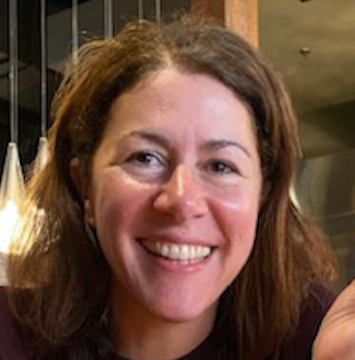 Mindy has been the Director of Publications and Multimedia at GLI since 2017. She manages all digital resources and technology with a team that spans website development, database management, and video production. Her interest in American history is what brought her to GLI from a career in publishing. In her spare time (since the pandemic) she plays tennis, hikes, and loves to travel.
Mindy has been the Director of Publications and Multimedia at GLI since 2017. She manages all digital resources and technology with a team that spans website development, database management, and video production. Her interest in American history is what brought her to GLI from a career in publishing. In her spare time (since the pandemic) she plays tennis, hikes, and loves to travel.
Mindy’s Pick:
The River of Doubt: Theodore Roosevelt’s Darkest Journey by Candice Millard
“The story of Teddy Roosevelt’s treacherous ride down the Amazon River after his presidential defeat in 1912. It’s a page turner. Very stressful, very good!”
Sasha Rolón Pereira, Director of Program Operations and Director, Hamilton Education Program
 Sasha has logged many miles overseeing the Hamilton Education Program for the Institute, partnering with school districts across the country to provide the educational component for Title I high schools’ interaction with and viewing of the hit musical Hamilton. She has led the initiative since it first started in October 2015. A graduate of Boston University, Sasha joined the Gilder Lehrman Institute in 2002 and has overseen a number of high-profile projects.
Sasha has logged many miles overseeing the Hamilton Education Program for the Institute, partnering with school districts across the country to provide the educational component for Title I high schools’ interaction with and viewing of the hit musical Hamilton. She has led the initiative since it first started in October 2015. A graduate of Boston University, Sasha joined the Gilder Lehrman Institute in 2002 and has overseen a number of high-profile projects.
Sasha’s Pick:
The Teammates: A Portrait of Friendship by David Halberstam
“A book about the friendship between members of the 1949 Red Sox championship teams. When Ted Williams was dying, three of his former baseball teammates—Johnny Pesky, Dom DiMaggio, and Dick Flavin—went on a three-day road trip to see him one last time. Halberstam documents their journey but also tells the story of the 1949 team and their 60+ years of friendship and love for each other. I bought this for my dad years ago for Xmas and it has passed through everyone’s home and is now on one of my bookshelves. It’s a heartwarming story about baseball legends and their struggles after their baseball careers.”
Daniel Pecoraro, Senior Program Manager
 Daniel is part of the team responsible for the Institute’s popular Teacher Seminars each summer and various professional development programs, including the How Did We Get Here? series of virtual PD programs throughout the school year.
Daniel is part of the team responsible for the Institute’s popular Teacher Seminars each summer and various professional development programs, including the How Did We Get Here? series of virtual PD programs throughout the school year.
Race for Profit: How Banks and the Real Estate Industry Undermined Black Homeownership by Keeanga-Yamahtta Taylor
“Taylor’s book uncovers an era of housing policy that is little discussed and does so in a way that is evocative and anguishing.”
All these books are available at the Gilder Lehrman Book Shop.
By purchasing any of the books mentioned above through the links provided, you are helping to support the programming of the Gilder Lehrman Institute. We receive an affiliate commission from every sale and put that money to work to develop high-caliber American history programming.
OPPORTUNITIES FOR STUDENTS
Announcing In Their Own Words: A New Student Essay Contest
In Their Own Words is a new essay contest open to high school students at Gilder Lehrman Affiliate Schools.
The contest offers students the opportunity to examine primary sources in the Gilder Lehrman Collection and to demonstrate their skills in historical interpretation and textual analysis.
The Gilder Lehrman Institute is pleased to offer
- Ten $500 prizes for high school students in grades 10–12
- Ten $250 prizes for each winner’s teacher for history programming or classroom resources
In order to participate, teachers and students must complete the following steps:
Step 1: Teachers, please sign up for free trial access to American History: 1493–1945, a database containing more than 60,000 digitized documents from the Gilder Lehrman Collection. Each school—and its students—will have free access during the trial window.
Step 2: Students, please select 1–2 documents from American History: 1493–1945 and write an essay according to the following guidelines:
- Describe how reading/viewing the primary source document(s) changed your understanding of an event, historical figure, or time period.
- Use evidence from the document to support your response.
- Keep your essay to 500–600 words in length.
- Cite additional primary or secondary sources if necessary to support your ideas.
- View the full contest instructions here.
Step 3: Students, submit your essay by the deadline of March 1, 2022. The submission portal will open on December 1, 2021.
To confirm that your school is a Gilder Lehrman Affiliate School or to register your school for free, go here.
Need help getting started? Read our Guide to American History: 1493–1945, which includes essay ideas, advice for navigating the database, links to thematic resources, and more.
American History, 1493–1945 is used by more than 100 universities and institutions—including Harvard, Yale, and the Library of Congress. This resource features more than 60,000 documents from the Gilder Lehrman Collection, in-depth search functionality, and interactive tools.
Affiliate School History Scholarships
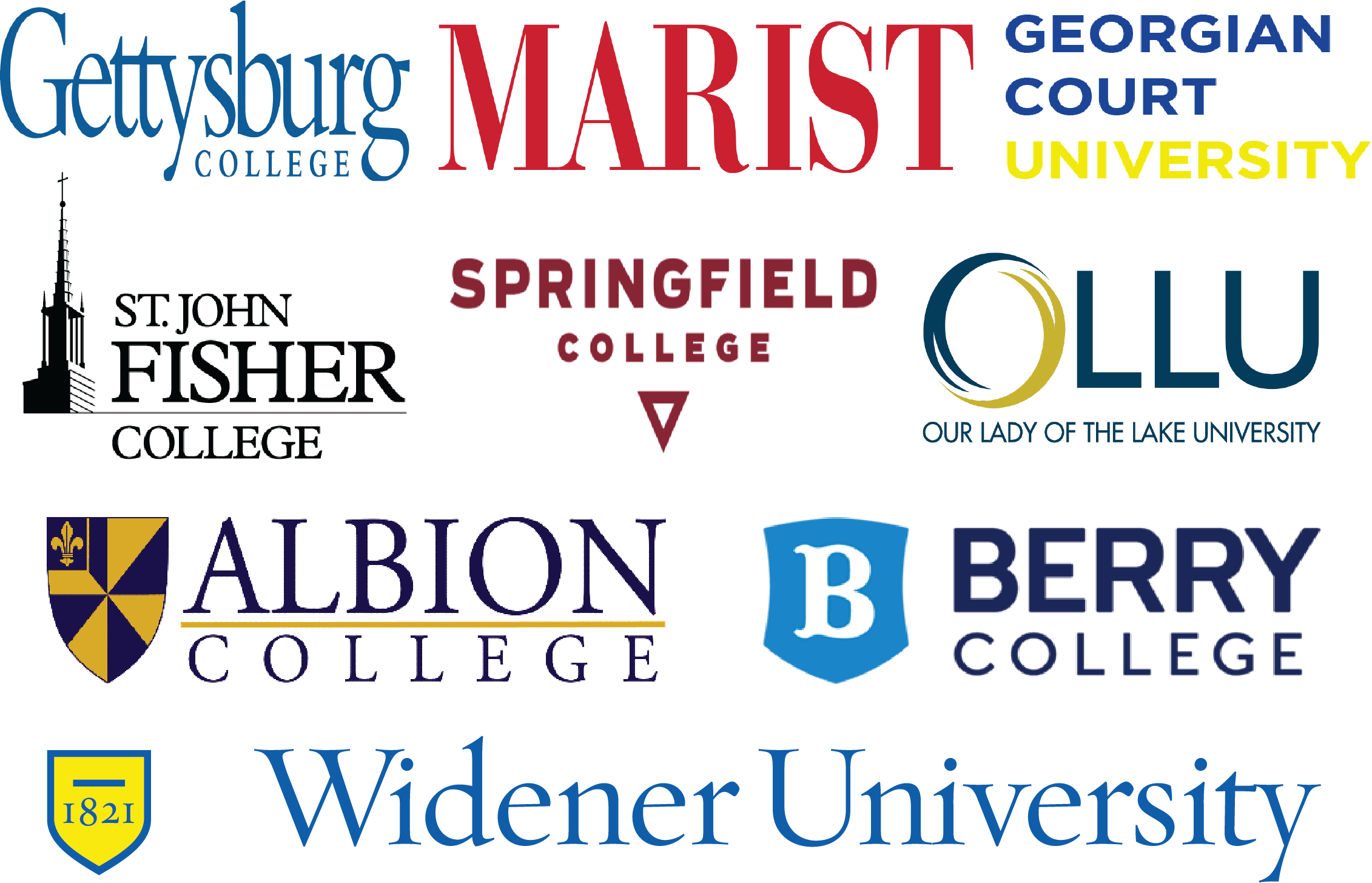 The Gilder Lehrman Institute has partnered with several colleges and universities across the country to offer scholarships of $5,000 or more each year for up to four years exclusively for Affiliate School students!
The Gilder Lehrman Institute has partnered with several colleges and universities across the country to offer scholarships of $5,000 or more each year for up to four years exclusively for Affiliate School students!
Nine colleges and universities in seven states have committed to scholarships in Fall 2022:
- Albion College (Albion, MI)
- Berry College (Mt. Berry, GA)
- Georgian Court University (Lakewood, NJ)
- Gettysburg College (Gettysburg, PA)
- Marist College (Poughkeepsie, NY)
- Our Lady of the Lake University (San Antonio, TX)
- Springfield College (Springfield, MA)
- St. John Fisher College (Pittsford, NY)
- Widener University (Chester, PA)
Click the name of the school for more information about the scholarship, eligibility, and how to apply.
Email affiliate@gilderlehrman.org if you have additional questions.
New Professional Development for Teachers at GLI
The 2021–2022 How Did We Get Here? Series
Professional Development on Topical Issues
The How Did We Get Here? professional development series provides teachers with ready-made, classroom-friendly resources on topics in American history that are front-and-center in current events, such as the Great Migration, US foreign policy from before World War I to now, and the experiences of American Indians, Asian Americans, Latino and Latina Americans, and the LGBTQ community.
The programs, held online on Zoom, feature lectures by leading scholars of American history and expert advice for teaching these topics in the classroom from some of the Gilder Lehrman Institute’s Master Teachers. All participants receive Teaching Literacy through History™ lesson plans with enhanced features to align with online learning practices.
Upcoming 2022 Workshops
Learn more and register here.
January 11, 2022 8:00 p.m.–10:00 p.m. ET
“The Transatlantic Slave Trade” with Gunja SenGupta (Professor of History, Brooklyn College, CUNY) and Master Teacher Justin Emrich (2016 Ohio History Teacher of the Year)
February 8, 2022 8:00 p.m.–10:00 p.m. ET
“The Great Migration” with Steven Hahn (Professor of History, New York University, and winner of the Pulitzer and Bancroft Prizes) and Senior Education Fellow Ron Nash
March 1, 2022 8:00 p.m.–10:00 p.m. ET
“US Foreign Policy: Post–World War I to the 21st Century” with Robert K. Brigham (Professor of History and International Relations on the Shirley Ecker Boskey Chair and Director of the Vassar-West Point Initiative, Vassar College) and Master Teacher John Irish (2020 Texas History Teacher of the Year)
April 5, 2022 8:00 p.m.–10:00 p.m. ET
“US Foreign Policy: The Early Republic to World War I” with Jason Opal (Associate Professor of History, McGill University, and winner of the Organization of American Historians’ Binkley-Stephenson Award) and Master Teacher John Irish (2020 Texas History Teacher of the Year)
May 3, 2022 8:00 p.m.–10:00 p.m. ET
“Asian American History” with Jane Hong (Associate Professor of History, Occidental College) and Master Teacher Patience LeBlanc (2017 Texas History Teacher of the Year)
June 7, 2022 8:00 p.m.–10:00 p.m. ET
“The History of LGBTQ Social Movements in America” with Chelsea Del Rio (Associate Professor of History, LaGuardia Community College, CUNY, and Co-Chair of the Committee on LGBT History for 2021-23) and Master Teacher Kory Loyola (2016 New Jersey History Teacher of the Year)
New Self-Paced Courses
Gilder Lehrman Self-Paced Courses offer K–12 teachers the opportunity to watch online courses, review supporting primary source documents, and test their knowledge with quizzes for fifteen professional development contact hours. In the fall of 2021, the following courses were added to the dozens of existing offerings.
The Age of Revolutions, 1775–1804
Nora Slonimsky (Professor of History, Iona College and Director, Institute for Thomas Paine Studies) examines the American Revolution against the backdrop of the global revolutions that took place in this time period, and explores how this tumultuous era speaks to our own time.
Black Lives in the Founding Era
In this course, Professor James Basker (Richard Gilder Professor of Literary History at Barnard College, Columbia University) and a number of guest speakers restore to view the lives and writings of a wide array of African Americans in the period 1760 to 1800. Drawing on rare and long-forgotten texts, it focuses on prominent individuals such as Phillis Wheatley, Benjamin Banneker, Jupiter Hammon, Absalom Jones, Richard Allen, Prince Hall, and James Forten, along with others who lived more ordinary lives—Black soldiers, formerly enslaved people petitioning the government, women both enslaved and free, religious and civic leaders, and writers of early slave narratives.
Capitalism in American History
Professor David B. Sicilia (Henry Kaufman Chair of Financial History at the Robert H. Smith School of Business, University of Maryland) explores how capitalism emerged in British North America; economic dimensions of the American Revolution and Constitution; the role of slavery, the state, and corporations in nineteenth-century capitalist expansion; America’s unique pathways to industrialization; the rise of big business and its impact on US politics, society, and industrial work; the Second Industrial Revolution; causes of the Great Depression; how the New Deal and World War II created a mixed economy; the predominance of consumerism in postwar America; the erosion of US global competitiveness in the 1970s; the rise of neoliberalism and financialization since the 1980s; and the impact of economic theory on economic policymaking.
The Great Depression and the New Deal
Professor Eric Rauchway (Distinguished Professor of History at the University of California) considers the causes and consequences of the economic slump of 1929–1933 with the economic recovery of 1933–1941 under the New Deal. The course examines the scope and effects of the Great Depression, considering particularly how it placed democratic institutions in peril and contributed to the rise of fascist movements, then considering the New Deal not only as a program for restoring economic prosperity but more importantly as an effort to reinvigorate democratic institutions, concluding with an investigation of the transition from the New Deal into mobilization for the Second World War.
Learn more about these and many more courses and register here.
BOOK PRIZE WINNERS
Since its founding in 1994, the Gilder Lehrman Institute has supported exemplary scholarship and promoted the public’s engagement with American history through its book prizes. Each recognizes the best book of the year in its field. A jury of leading scholars evaluates the entries and chooses a pool of finalists from which the prize’s board selects the winning book. The winner is honored at an award ceremony providing an opportunity for the public, including teachers and students, to hear the author speak.
The Gilder Lehrman Lincoln Prize
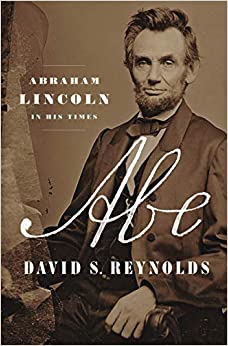 In February 2021, Gettysburg College and the Gilder Lehrman Institute of American History announced that David S. Reynolds, author of Abe: Abraham Lincoln in His Times (Penguin Press), was the recipient of the 2021 Gilder Lehrman Lincoln Prize.
In February 2021, Gettysburg College and the Gilder Lehrman Institute of American History announced that David S. Reynolds, author of Abe: Abraham Lincoln in His Times (Penguin Press), was the recipient of the 2021 Gilder Lehrman Lincoln Prize.
The prize is awarded annually for the finest scholarly work in English on Abraham Lincoln, the American Civil War soldier, or the American Civil War era.
Reynolds’s 1,088-page biography Abe: Abraham Lincoln in His Times was named one of the Wall Street Journal’s Ten Best Books of the Year and a Washington Post Notable Book of the Year.
Read more about the book and the Gilder Lehrman Lincoln Prize here.
In September, the 2021 George Washington Prize was awarded to Mary Beth Norton for 1774: The Long Year of Revolution.
The annual award recognizes the past year’s best work on the nation’s founding era, especially those that have the potential to advance a broad public understanding of early American history.
1774 tells the important story of the sixteen months that separated the destruction of the East India Company tea in Boston Harbor to the marching of troops to Lexington and Concord. Readers are able to experience the uncertainty and unpredictability of this revolutionary moment.
Read more about the book and the George Washington Prize here.
Gilder Lehrman Prize for Military History
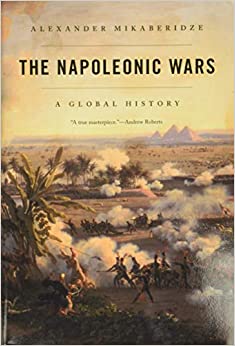 In November, the Gilder Lehrman Institute of American History announced that Alexander Mikaberidze was awarded the eighth annual Gilder Lehrman Prize for Military History for The Napoleonic Wars: A Global History (Oxford University Press). The $50,000 prize is bestowed in recognition of the best book in the field of military history published in English during the previous calendar year.
In November, the Gilder Lehrman Institute of American History announced that Alexander Mikaberidze was awarded the eighth annual Gilder Lehrman Prize for Military History for The Napoleonic Wars: A Global History (Oxford University Press). The $50,000 prize is bestowed in recognition of the best book in the field of military history published in English during the previous calendar year.
Of his prize-winning book, Mikaberidze said, “Studying the vast body of scholarship dedicated to the Napoleonic era, I felt that the existing literature was too focused on events in Europe. The Napoleonic Wars had ramifications far beyond the European borders, so I decided to write a book showcasing the wider impact of this turbulent era.”
Read more about the book and the Gilder Lehrman Prize for Military History here.
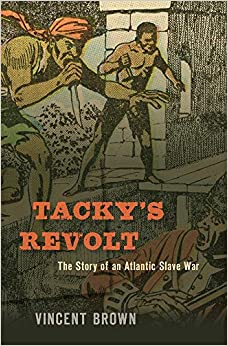 Yale University’s Gilder Lehrman Center for the Study of Slavery, Resistance, and Abolition announced two co-winners for the twenty-third annual Frederick Douglass Book Prize: Vincent Brown for Tacky’s Revolt: The Story of an Atlantic Slave War (The Belknap Press of Harvard University Press) and Marjoleine Kars for Blood on the River: A Chronicle of Mutiny and Freedom on the Wild Coast (The New Press). Jointly sponsored by the Gilder Lehrman Institute of American History and the Gilder Lehrman Center for the Study of Slavery, Resistance, and Abolition at the Yale MacMillan Center, this annual prize recognizes the best book written in English on slavery, resistance, and/or abolition published in the preceding year.
Yale University’s Gilder Lehrman Center for the Study of Slavery, Resistance, and Abolition announced two co-winners for the twenty-third annual Frederick Douglass Book Prize: Vincent Brown for Tacky’s Revolt: The Story of an Atlantic Slave War (The Belknap Press of Harvard University Press) and Marjoleine Kars for Blood on the River: A Chronicle of Mutiny and Freedom on the Wild Coast (The New Press). Jointly sponsored by the Gilder Lehrman Institute of American History and the Gilder Lehrman Center for the Study of Slavery, Resistance, and Abolition at the Yale MacMillan Center, this annual prize recognizes the best book written in English on slavery, resistance, and/or abolition published in the preceding year.
In Tacky’s Revolt, Vincent Brown expands on his pivotal digital project “Slave Revolt in Jamaica, 1760–1761.” Guiding readers through what he calls the “greatest slave insurrection in the eighteenth-century British Empire,” Brown argues that Tacky’s Revolt formed a larger part of what he calls the Atlantic Slave Wars, of which the Haitian Revolution is one of the most famous historical nodes.
In Blood on the River, Marjoleine Kars treats the 1763–1764 rebellion of enslaved Africans in the Dutch colony of Berbice with striking originality. Through creative and subtle analysis of participant testimonies, Kars uncovers motives and aspirations to explain how a protest against harsh treatment became a social revolution.
Read more about both books and the Frederick Douglass Book Prize here.
All the Gilder Lehrman book prize-winning books are available at the Gilder Lehrman Book Shop. By purchasing any of them, you are helping to support the programming of the Gilder Lehrman Institute. We receive an affiliate commission from every sale and put that money to work to develop high-caliber American history programming.